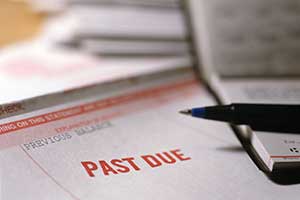
Be Smart about Using Your Income Tax Return to File for Bankruptcy
If you are thinking about filing bankruptcy in Ohio, you should consider what to do about any tax refunds you expect to receive or already have received. Depending on how you handle it, some or all of your refund may be protected. If you wind up filing for bankruptcy, you are permitted to use your tax refunds to pay for your bankruptcy attorney fees and court costs.
What Happens to Tax Refunds in Bankruptcy?
Tax refunds are particularly tricky to deal with, because you may owe taxes from a time prior to your bankruptcy and you may continue accruing taxes after you file. Whether you get to keep your refund depends on factors such as when you file, when you receive your refund, and whether you can use available Ohio exemptions.
Having the help of a knowledgeable legal professional is essential to avoid problems that could even lead to having your bankruptcy revoked. The skilled and seasoned Ohio debt-relief attorneys at Fesenmyer Cousino Weinzimmer understand that even the most well-intentioned people can make mistakes with money.
We offer a free consultation to evaluate your situation and help you take steps that enable you to not only keep your tax refund but get you on the path to reaching your financial goals.
Will Bankruptcy Affect Your Tax Refund?
In some cases, tax refunds can be used to help release your debts, depending on your specific circumstances. Understanding when you can and cannot use a refund depends on what type of bankruptcy filing you must use and what other assets you own.
Chapter 7 Bankruptcy and Tax Refunds
With a Chapter 7 bankruptcy, the bankruptcy trustee liquidates all your non-exempt assets and uses the proceeds to pay your creditors. Any eligible debts that remain are discharged, meaning you do not have to pay them.
In Chapter 7, a tax refund is an asset that can be used to pay creditors. However, a certain amount of the refund is exempt and can be kept. Although you can keep any assets you receive after filing for bankruptcy, a tax refund often involves a process that begins before the bankruptcy filing date and continues afterward.
If you cannot exempt your refund, whatever is not protected must be handed over to the bankruptcy trustee. If you do not do this, your bankruptcy discharge will be revoked, and you will continue to owe your debts.
Chapter 13 Bankruptcy and Tax Refunds
In Chapter 13 bankruptcy, you do not give up your assets. Instead, you pay some or all of your debts through a repayment plan over the course of three to five years. Any eligible debt left over is discharged.
In a Chapter 13 bankruptcy, you are required to send a copy of your tax return every year to the bankruptcy trustee so that they can determine if any of your refund must be paid to your creditors. A certain amount of your refund will be exempt, which you can keep. The trustee will let you know each year how much of your refund you can keep.
How to Exempt Refunds in Chapter 7
In Chapter 7 bankruptcy, your bankruptcy estate will include income tax refunds that you received before filing and those that are due to you for the portion of the tax year before you filed for bankruptcy.
A court-appointed bankruptcy trustee may take refunds to repay your unsecured creditors unless you can protect them by doing the following:
Use Your Applicable Exemptions
There are certain exemptions that can protect your tax return when filing for bankruptcy. For example, the Earned Income Tax Credit and Additional Child Tax Credit are exempt under Chapter 7 bankruptcy in Ohio.
In addition, you may be able to keep the entire refund with a Wildcard Exemption, which exempts a certain amount of value in any property. A knowledgeable bankruptcy attorney can review these exemptions with you.
Coordinate Timing
If you plan ahead properly, you should be able to keep your tax refund or use the money for bankruptcy or other expenses. Before filing, make sure that you either:
- Increase withholding to reduce your refund to a minimal amount
- Spend the refund on necessary expenses, such as rent, home repair, utilities, medical expenses, food, and clothing
- Include the refund in your bankruptcy exemptions
How to Exempt Refunds in Chapter 13
In a Chapter 13, a certain amount of your tax refund will be exempt, which means you get to keep it. If your refund is over that amount, it is possible to modify a Chapter 13 plan to excuse payment of tax refunds in certain circumstances. You can file a motion to retain for necessary living expenses to excuse the tax refund or include language in the plan that excuses tax refunds.
However, to take advantage of this process, you must use the refund for something necessary that is unexpected and not in your current budget.
To ensure you are following the specifications, your motion to retain your income tax refund should:
- Specify which tax refund you need to excuse
- List the amount of the refund
- Detail why you need to keep the money
Examples of situations in which you may excuse a tax refund:
- Car repair
- Appliance repair
- Replacing a furnace
- Unexpected medical or dental expenses for yourself or your children
To protect yourself and your bankruptcy filing, you should keep all documentation that pertains to how you spent the money. If you include the money in your bankruptcy plan, you will have to show the court you have a compelling reason to do so.
Does a Tax Return Count as Income for Bankruptcy?
To file for Chapter 7, you may need to undergo a means test if your income is over the Ohio median income for a household your size. Part of this involves making a list of your assets, which includes various sources of income. Tax refunds are considered income and are subtracted from your expenses during the means test.
Tax Tips for Bankruptcy
There are some recommended actions you can take that will help your bankruptcy filing go as smoothly as possible. These steps include:
- If you have already filed for bankruptcy, give your attorney your tax records, and
- File your taxes on time each year.
Speak With a Skilled Bankruptcy Attorney Today for Help
The experienced and compassionate Ohio debt relief attorneys at Fesenmyer Cousino Weinzimmer know how difficult it is to make good financial decisions. We offer a free consultation to evaluate your entire financial situation by examining your income, your debts, and your goals, and we will help you find what works best for you.
As with other financial decisions, consider the long-term benefits of your tax refund instead of your short-term desire to spend. Using your refund to file for bankruptcy may be the best way to get out of debt, stay out of debt and make smart choices going forward. We are committed to determining which solutions will work best for you.
To learn more about how our firm can be of assistance, call one of our conveniently located office branches at 614-228-4435 (Columbus), 937-222-7472 (Dayton), or 877-654-5297 (Cincinnati) or use our online form to schedule your free consultation.


